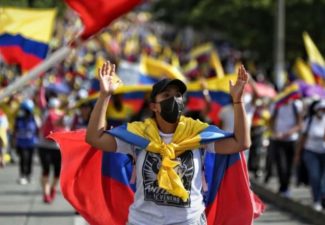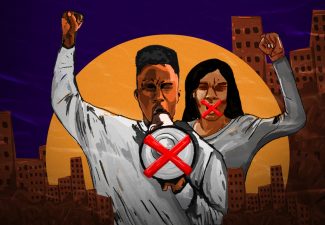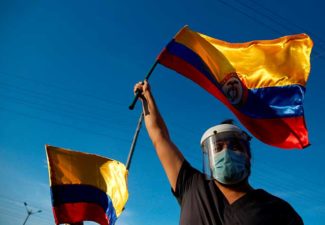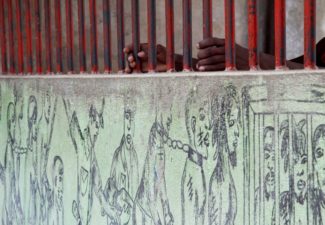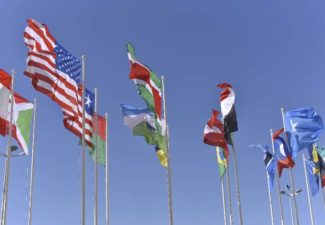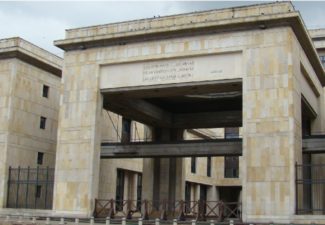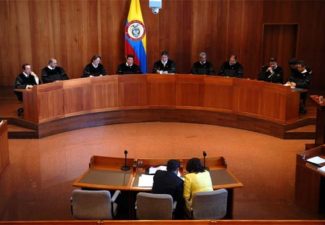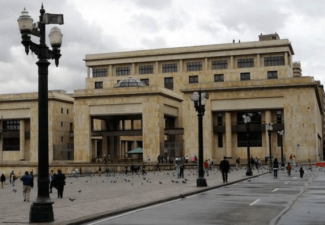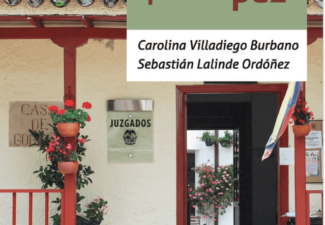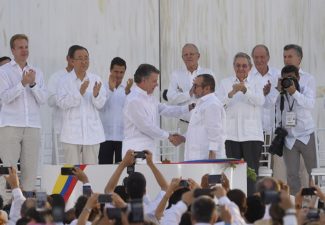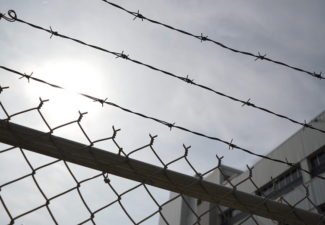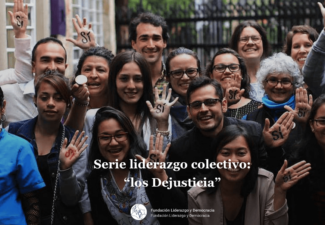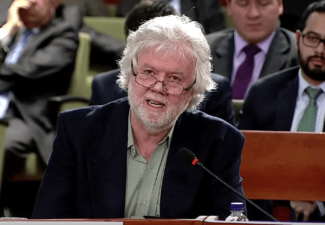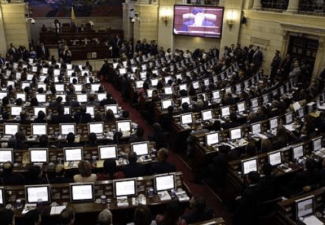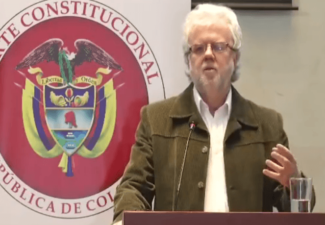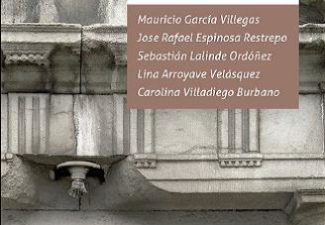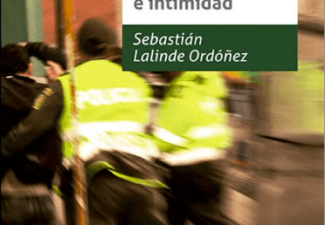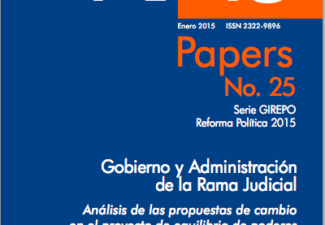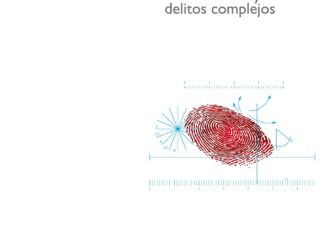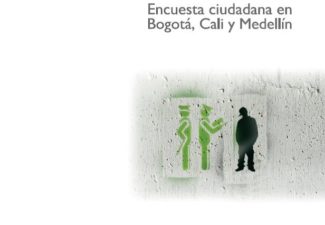Issue-Judiciary
Equality in freedom: Free Women for a fairer criminal policy
Prisons are a reflection of society, and in a sexist society where women face structural inequalities, they suffer even more from the impacts of the prison crisis. But women are resisting, and through the work of organizations such as Mujeres Libres, there is hope that their rights will become a reality.
Read MoreWhat is happening in Peru? The question of difficult answers
Two months after the self-coup and subsequent dismissal of Pedro Castillo, we take stock of what has happened and what are the possible solutions to the critical moment this country is going through.
Read More#SOSPeru: The repeated script of repression in Latin America
The stigmatization of social protest by Peru’s interim government has put civil society and the media in demanding guarantees for a dialogue that allows for political transition without violence.
Read MoreColombian Democracy in the Streets
Confronted with the violence in the protests, the government and political leaders, as well as social leaders, must first promote the de-escalation, putting human rights at the center of the crisis management.
Read MoreThe ABCs of the Social Protest and Human Rights Crisis in Colombia
If you have not yet understood the serious situation in the streets of Colombia since April 28, 2021, we explain three essential aspects of the social mobilization agenda in which violence has been an unfortunate protagonist.
Read MoreSupreme Court of Justice protects the right to protest against police violence
The Supreme Court of Justice of Colombia protected the right of all people to demonstrate and the duty of the authorities to “ward off, prevent and punish the systematic, violent and arbitrary intervention of the public force in demonstrations and protests.”
Read More4 Key Strategies to Reducing Sexual Violence Against Children
With the launch of the Alianza initiative, there is hope for a comprehensive change in sexual violence against children. But as always, effective implementation of such an ambitious program will undoubtedly have many challenges.
Read MorePrisons: What Force Can’t Do
“Heavy-handed” policies on crime in many countries in the Americas have not only brought prisons to crises around the continent, but have also failed to reduce crime and recidivism. A more humane penitentiary system, not one of terror, seems to be the solution that our continent needs.
Read MoreLawyers: What are they not for?
To what extents can lawyers go to defend the interests of their clients?
Read MoreThe justice needs of the world
States need to know the legal needs of their populations and the ways in which citizens act to manage and resolve those needs in order to design better schemes for the resolution of disputes and for providing access to justice.
Read MoreA single court?
The problem of “a single court,” proposed by Uribismo, is that in the concrete situation of Colombia, it contributes very little to the solution of the problems of our judicial system, and on the contrary, presents many risks.
Read MoreWhat justice reforms?
Several presidential candidates propose a justice reform; some have even said that they will hold a Constituent Assembly to achieve it. But beyond that, the candidates could discuss policies that would strengthen access to justice and the system’s legitimacy.
Read MoreA new opportunistic cartel
The Prosecutor’s Office should provide information on negotiations such as those made with former Governor Lyons to assess whether they are effective and prevent another cartel from forming.
Read MoreInsecurity: desperate measures
Justice through people’s own hands and the deaths in neighborhoods fights show the failure of the State in several sectors of the city, especially those that are outside the tourist circuit.
Read MoreInabilities in the Special Jurisdiction for Peace
The Senate’s decision to prohibit people who have litigated human rights cases against the State from becoming JEP (Special Jurisdiction for Peace) magistrates is grossly unconstitutional.
Read MoreGuide to clarify rumors about the Peace Agreement
In light of the inaccurate impressions, misinterpretations and half-truths that are circulating, we consider it necessary to clarify what the Government and the ex-guerrilla of the FARC-EP really agreed on, and how those commitments are being implemented.
Read MoreWe call for immediate action to address the judicial crisis
The Center for the Study of the Law, Justice and Society (Dejusticia) and the Excellence in Justice Corporation (CEJ), call on the high courts and the Attorney General to take immediate measures of transparency to face corruption and restore public confidence in the judiciary.
Read MoreTerritorial Justice System for Peace
This book is part of the collection Documents for Peacebuilding in which Dejusticia presents ideas to face the complex challenge of building a stable and lasting peace in the post-agreement period. This specific document addresses the need to strengthen the national judicial system in an articulated manner and with an emphasis on rural areas and on overcoming the armed justice that operates in many places.
Read MoreIt is necessary to consolidate the JEP as soon as possible: press release
Dejusticia, together with other civil society organizations and academics, celebrate the definitive step of the FARC-EP’s abandonment of arms to end the conflict and stress the importance of consolidating the Special Jurisdiction for Peace as the next key step.
Read MoreGpaz and Dejusticia recommend the application of a gender based approach in criminal policy bill
The Working Group on Gender in Peace (GPAZ) and Dejusticia presented an analysis of Bill No. 148 of 2016 (currently in the Senate). The bill is currently being handled by the First Commission and amends provisions of the Criminal Code, the Code of Criminal Procedure , the Penitentiary and Prison Code, and the Childhood and Adolescence Code.
Read MoreInterventions in lawsuits against four aspects of the New Police Code
Dejusticia carried out citizen interventions regarding the constitutionality of Police Code articles that establish police measures for several categories of persons and activities.
Read MoreAn organization with collective leadership: our history reviewed in the Leader Network
The Leader Network chose Dejusticia to initiate the series of profiles on collective leadership. The profile published in Silla Vacía investigates three fundamental measures of leadership: vision, example and results.
Read MoreDejusticia Files Suit to Protect the Right to Privacy Under the New Police Code in Colombia
Dejusticia filed a lawsuit before the Constitutional Court, arguing that several articles of Colombian Law 1801 of 2016 (Police Code) violate the right to privacy.
Read MoreDejusticia intervenes in lawsuit against Police Code in articles that regulate the right to protest
Congress acted unconstitutionally when it issued the new police code because it attempted to regulate social protest through the wrong legislative channels.
Read MoreEffective Criminal Defense in Latin America
This book analyzes the national and regional standards related to effective criminal defense. It is the result of a joint research project conducted with different organizations including Dejusticia.
Read MoreRodrigo Uprimny Intervnes in Hearing Regarding the Balance of Powers Reform
Last March 30th there was a hearing about the complaint presented by the Nation’s Public Prosecutor, Eduardo Montealegre against the Balance of Powers Reform. This was Rodrigo Uprimny’s contribution.
Read MoreCitizen Intervention in Favor of Changed Introduced by the Balance of Powers Reform regarding Presidential Re-election
The Balance of Powers Reform excluded in regards to presidential re-election the other mechanisms of constitutional reform that are included in the Constitution: legislative act and constitutional referendum of a governmental initiative. Dejusticia argues that this is not unconstitutional.
Read MoreIs the new judicial governance model adopted by the Legislative Act 02 of 2015 or “Balance of Powers Reform” constitutional? Rodrigo Uprimny intervenes in public hearing before the Constitutional Court
On September 9th, 2015 Rodrigo Uprimny participated in a public hearing called by the Constitutional Court during the process of assessing the constitutionality of the Legislative Act 02 of 2015 or the “balance of powers reform.” In his intervention, Rodrigo Uprimny argues that the balance of power reform did not replace the fundamental pillar of judicial independence by modifying the 1991 Constitution’s model of judicial governance.
Read MoreMulti-Door Courthouses: A Good Idea Badly Managed
This research project aims to do a diagnostic about the National Program on Multi-Door Courthoses and make some public policy recommendations that could magnify their virtues and improve access to justice.
Read MoreIntervention before the Constitutional Court Regarding Legal Regulations on Obligatory Military Service and Its Application to Trans* People
Dejusticia intervened in a lawsuit arguing the unconstitutional nature of laws that regulate military service for trans people. For the plaintiffs these laws ignore their gender identity. Dejusticia has asked the Court to declare itself inhibited from releasing a substantive ruling.
Read MorePolice Searches at Discretion? The Tension between Security and Privacy
This text seeks to harmonize the duty of the National Police to preserve public order and guarantee security with the right to privacy.
Read MoreGovernance and Administration of the Judiciary
Analysis of the reform proposals in the balance of powers project.
Read MoreTowards a Design that Guarantees Adequate Independence of the Judiciary and the Best Method for Selecting Judges for the High Courts
This chapter’s argument is that the independence of the judiciary is a guarantee that without doubt should be preserved but is not absolute and, thus, allows for qualifications in support of more transparency and accountability of the judiciary
Read MoreIrrational Efforts: Criminal Investigations of Homicide and other Complex Crimes
The Colombian Attorney General’s Office´s quantitative records show that investigative efforts are employed irrationally. The absence of a strategic prioritization policy —as opposed to the unclear and arbitrary way officials currently process cases— does not allow criminal policy efforts to focus on investigating the most important cases.
Read MoreSecurity, Police and Inequality: Citizen Survey in Bogotá, Cali, and Medellín
This survey seeks quantitative evidence about how people experience and perceive various aspects of the security policy, in particular policing practices. It also explores whether security policies disproportionately effect vulnerable groups.
Read MoreInsufficient Judicial Independence, Deformed Preventive Prison: The cases of Argentina, Colombia, Ecuador and Peru
In this study we analyze the main pressures and interferences to which Colombian judges and prosecutors are subject when they have to make decisions regarding the imposition of preventive detention
Read MoreNational Survey of Legal Needs
Commissioned by the Ministry of Justice and the World Bank, this survey assesses the state of access to justice in urban Colombia, identifies obstacles, and offers recommendations to improve access to justice and facilitate conflict resolution.
Read MoreChallenge to Francisco Javier Ricaurte Gómez’s appointment as a judge of the High Judiciary Council for violation of article 126 of the Constitution
Dejusticia challenged the appointment of Francisco Javier Ricaurte Gómez to the High Council of the Judicary because certain magistrates of the Council violated article 126 of the Constitution by naming Ricaurte to a public position when he had previously participated in their appointment to the Council.
Read More


